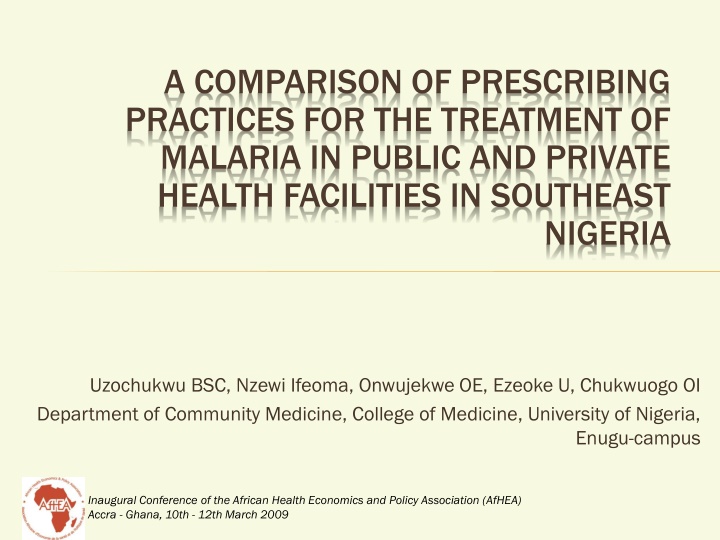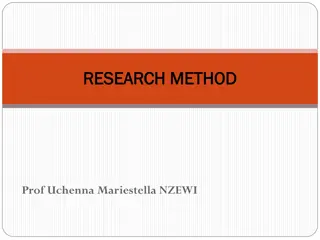
Prescribing Practices for Malaria Treatment in Public and Private Health Facilities in Southeast Nigeria
Explore the comparison of prescribing practices for malaria treatment in public and private health facilities in Southeast Nigeria. The study highlights the prevalence of irrational prescribing practices and the potential impact on drug resistance. Results show discrepancies in drug doses, use of injections, and antibiotics between public and private facilities.
Download Presentation

Please find below an Image/Link to download the presentation.
The content on the website is provided AS IS for your information and personal use only. It may not be sold, licensed, or shared on other websites without obtaining consent from the author. If you encounter any issues during the download, it is possible that the publisher has removed the file from their server.
You are allowed to download the files provided on this website for personal or commercial use, subject to the condition that they are used lawfully. All files are the property of their respective owners.
The content on the website is provided AS IS for your information and personal use only. It may not be sold, licensed, or shared on other websites without obtaining consent from the author.
E N D
Presentation Transcript
A COMPARISON OF PRESCRIBING PRACTICES FOR THE TREATMENT OF MALARIA IN PUBLIC AND PRIVATE HEALTH FACILITIES IN SOUTHEAST NIGERIA Uzochukwu BSC, Nzewi Ifeoma, Onwujekwe OE, Ezeoke U, Chukwuogo OI Department of Community Medicine, College of Medicine, University of Nigeria, Enugu-campus Inaugural Conference of the African Health Economics and Policy Association (AfHEA) Accra - Ghana, 10th - 12th March 2009
BACKGROUND BACKGROUND Polypharmacy and irrational prescription of antimalaria drugs and injections in general are indications of irrational prescribing practices and may lead to drug resistance. The prescribing practices in the public and private health facilities in the treatment of malaria are not well known in Nigeria Inaugural Conference of the African Health Economics and Policy Association (AfHEA) Accra - Ghana, 10th - 12th March 2009
OBJECTIVES OBJECTIVES To determine the prescribing practices for the treatment of malaria in public and private health facilities at the primary health care level in Enugu urban of south east Nigeria. Inaugural Conference of the African Health Economics and Policy Association (AfHEA) Accra - Ghana, 10th - 12th March 2009
METHODOLOGY METHODOLOGY A descriptive, cross-sectional study took place in Enugu urban, southeast Nigeria in December 2007 Treatment records from Primary health centers were randomly selected retrospectively and prescriptions from the private clinics were collected prospectively using surrogate patients. Inaugural Conference of the African Health Economics and Policy Association (AfHEA) Accra - Ghana, 10th - 12th March 2009
METHODOLOGY METHODOLOGY One hundred prescription records were collected from four health centers (25 per health center), and four prescriptions each were collected from 10 private clinics (40 total). These prescriptions were analyzed to determine the percentage of drugs appropriately prescribed; percentages of prescribed injection and antibiotics, average number of drugs per case. Inaugural Conference of the African Health Economics and Policy Association (AfHEA) Accra - Ghana, 10th - 12th March 2009
RESULTS RESULTS Antimalaria drugs were prescribed in wrong doses in private and public health facilities (25 vs. 39.3% respectively) More chloroquine injections (87.7 vs 45.0% respectively) were prescribed in private than public health facilities (p<0.05). More antibiotics (64.3 vs 23.0% respectively) were prescribed in private than public health facilities (p<0.05). Inaugural Conference of the African Health Economics and Policy Association (AfHEA) Accra - Ghana, 10th - 12th March 2009
RESULTS RESULTS The public health centers had an average of 6.2 drugs per prescription against 3.2 in the private facilities (p<o.05) Polypharmacy and irrational prescription of vitamins and other combination preparations was common in both public and private facilities. Inaugural Conference of the African Health Economics and Policy Association (AfHEA) Accra - Ghana, 10th - 12th March 2009
RESULTS 100 90 80 70 60 Private (%) 50 Public (%) 40 30 20 10 0 Wrong dose of Antimal CQ Injections Antibiotics No. of drugs per prescription Inaugural Conference of the African Health Economics and Policy Association (AfHEA) Accra - Ghana, 10th - 12th March 2009
CONCLUSION & RECOMMENDATIONS CONCLUSION & RECOMMENDATIONS Prescribing practices by both private and public health workers are irrational and these were more with the private. Strategies to ensure appropriate and rational drug prescribing among health workers in both private and public health facilities such as prescription education are recommended. Inaugural Conference of the African Health Economics and Policy Association (AfHEA) Accra - Ghana, 10th - 12th March 2009
CONCLUSION & RECOMMENDATIONS CONCLUSION & RECOMMENDATIONS More detailed studies (for example by Focus Group discussions and structured interviews) should be undertaken to find out reasons for the over prescription and to develop future interventions to correct this Inaugural Conference of the African Health Economics and Policy Association (AfHEA) Accra - Ghana, 10th - 12th March 2009
THANK YOU Inaugural Conference of the African Health Economics and Policy Association (AfHEA) Accra - Ghana, 10th - 12th March 2009



